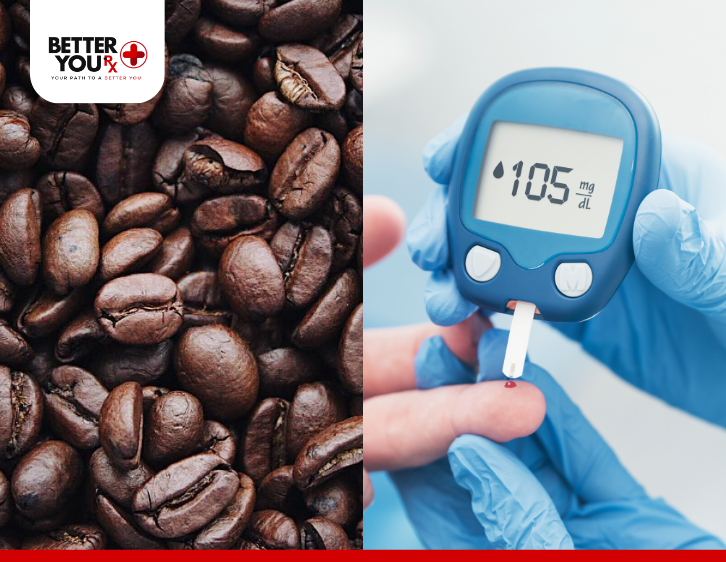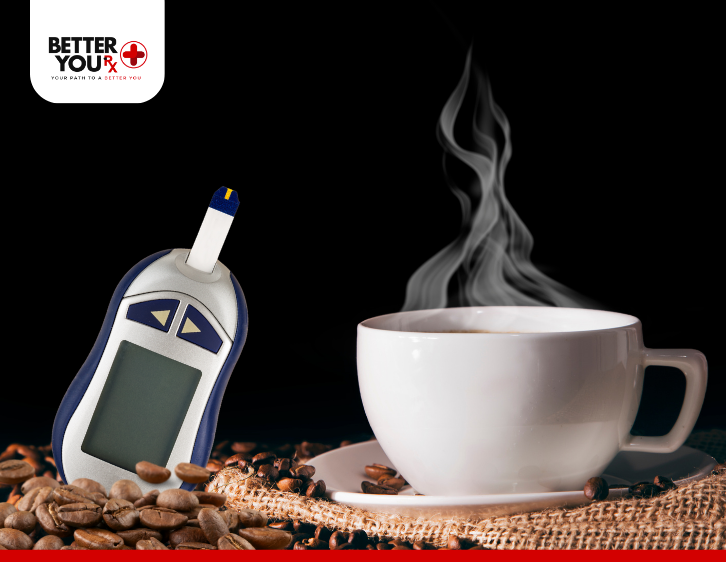Coffee is a beloved beverage for millions, often serving as a comforting morning ritual or a much-needed boost in the afternoon. But for those with diabetes, a common question arises: Can coffee affect blood sugar levels? Is it safe for individuals with diabetes to indulge in their daily cup of joe, or could it disrupt their blood sugar control? Does caffeine impact insulin sensitivity, and if so, how much coffee is considered safe? These are crucial questions for anyone managing diabetes, and the answers aren’t as straightforward as you might think. In this article, we’ll explore how coffee affects blood sugar, what research says about caffeine and insulin resistance, and whether your daily cup of coffee might need a second thought.
How Coffee Affects Blood Sugar: The Basics
At its core, coffee is made from roasted coffee beans and contains caffeine, a stimulant that can have multiple effects on the body. For people with diabetes, the concern is how coffee affects blood sugar levels, and more specifically, how caffeine influences insulin resistance and glucose metabolism.
Caffeine is known to stimulate the release of adrenaline, the hormone that triggers the “fight or flight” response. This hormone can increase blood sugar levels by prompting the liver to release glucose into the bloodstream. The result? Your blood sugar may spike temporarily. However, the effect is not always the same for everyone, and it can vary depending on individual factors like the type of coffee consumed, how much is drunk, and how a person’s body processes caffeine.
Research on Coffee and Blood Sugar
A variety of studies have been conducted to understand the relationship between coffee consumption and blood sugar levels. While the effects are still being studied, there are some key findings:
- Caffeine and Insulin Sensitivity: Research suggests that caffeine can reduce insulin sensitivity, meaning the body’s cells may not respond as effectively to insulin, the hormone responsible for helping sugar enter cells. Reduced sensitivity to insulin means the body needs more insulin to keep blood sugar levels in check, which can be problematic for individuals with type 2 diabetes.
- Acute Effects on Blood Sugar: Some studies indicate that caffeine can cause a short-term increase in blood sugar levels. A study published in The American Journal of Clinical Nutrition found that consuming caffeine could elevate blood glucose levels in people with type 2 diabetes. This is because caffeine impairs insulin’s ability to regulate blood sugar effectively.
- Chronic Coffee Consumption: On the flip side, regular coffee drinkers, especially those who consume coffee over a long period, may experience a different response. Some studies suggest that coffee, when consumed consistently, may have protective effects against type 2 diabetes. This could be due to the antioxidants in coffee, which have anti-inflammatory properties and may improve insulin sensitivity over time.
The Role of Decaffeinated Coffee
While caffeine is a major factor in how coffee affects blood sugar, decaffeinated coffee may be a safer alternative for people with diabetes. Decaf coffee contains significantly less caffeine, which means it has a reduced effect on insulin sensitivity and blood glucose levels. Studies have shown that drinking decaf coffee may not lead to the same spike in blood sugar levels as regular coffee, making it a preferable option for those sensitive to caffeine.
Is Coffee Good or Bad for People with Diabetes?
The truth about coffee and diabetes is that it’s not a one-size-fits-all answer. The impact of coffee on blood sugar can vary based on several factors:
- Type of Coffee: The type of coffee you drink matters. For instance, sugary coffee beverages like lattes or frappuccinos can cause significant spikes in blood sugar due to the added sugars and syrups. Black coffee or coffee with minimal additives is a better choice for those managing their blood sugar levels.
- Individual Response: People with diabetes respond differently to coffee. While some may experience a noticeable spike in blood sugar, others may not. If you’re unsure of how coffee affects you, it’s a good idea to monitor your blood sugar levels before and after drinking coffee to see how your body reacts.
- How Much Coffee You Drink: Moderation is key. Drinking excessive amounts of coffee can lead to higher blood sugar levels, especially if combined with added sugar or creamers. A cup or two of black coffee may have minimal impact, but drinking multiple cups a day or consuming coffee drinks with sugar can be a different story.
- Other Ingredients: If you’re adding creamers, syrups, or sweeteners to your coffee, be mindful of the impact they can have on your blood sugar. These additives can cause a more significant rise in blood sugar levels, especially when consumed in large quantities.
Tips for Drinking Coffee with Diabetes
If you’re managing diabetes and want to continue enjoying coffee, here are some tips to minimize its impact on your blood sugar:
- Opt for Black Coffee: Stick to black coffee or use a splash of unsweetened almond milk or skim milk. Avoid adding sugar or artificial sweeteners, as they can spike your blood glucose.
- Monitor Your Blood Sugar: Keep an eye on your blood sugar levels after drinking coffee to understand how it affects you personally. If you notice a significant increase, consider cutting back on the amount or switching to decaf.
- Limit Coffee to Moderate Amounts: Too much caffeine can disrupt blood sugar regulation, so aim for no more than 2-3 cups of coffee per day.
- Go for Decaf: If you’re sensitive to caffeine, or if coffee causes noticeable spikes in blood sugar, consider switching to decaffeinated coffee. It may provide the comforting ritual of a warm beverage without the same effect on your blood glucose.
Conclusion
So, does coffee affect blood sugar? The answer is yes, but the impact varies depending on individual factors. Caffeine in coffee can temporarily raise blood sugar levels by reducing insulin sensitivity and prompting the liver to release glucose. However, if consumed in moderation and without added sugars or creamers, coffee can be enjoyed by most people with diabetes without significant adverse effects. If you’re uncertain about how coffee affects your blood sugar, consider monitoring your sugar levels or switching to decaf. Ultimately, the key is moderation and being mindful of how your body responds.
Before making any changes to your diet or coffee consumption habits, it’s always a good idea to discuss it with your healthcare provider, who can offer tailored advice based on your unique health needs.




